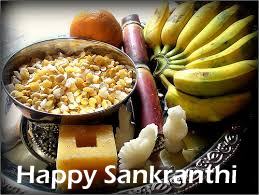Makara Sankranti

Makara Sankranti is among the most auspicious occasion for Hindus and is celebrated in almost all part of India. It is a harvest festival and is celebrated in many cultural forms with immense devotion and cheerfulness. The festival is celebrated on 14th January and is the only Indian festival whose date falls always on the same day each year with just a few exceptions.
The festival of Makar Sankranti marks the change of the sun into Makara rashi(Capicron). The festival is highly regarded by Hindus from North India to South India. The day is also known by various names and various traditions are witnessed as one experiences the festivals in different states. The Astronomical significance of the festival is that it marks the beginning of Uttarayana, the sun’s movement northward for six month period. The Sanskrit term “Shankramana” means to begin to move.
In Karnataka state in South India, Makar Sankranti is popularly known as Yellu Bella festival. Women’s draw very big Rangoli in front of there houses to welcome Uttaravana. On this auspicious day men, women and children wear colourful clothing, visiting near and dear ones and exchange Yellu Bella with Sugarcane and banana. Yellu means till (Sesame seeds) and Bella is Jagger y. A mixture of till(sesame seeds), Bella(jaggery), dry coconut(copra) and peanuts is given to friends, neighbor and relatives on the day. There is very popular saying Yellu Bella in Kannada – ellu bella tidnu, ollolle matadi! (Eat till seeds, jaggery and speak good words). The significance of this exchange is that sweetness should prevail in all the dealings.
The popular belief is that consuming sesame seed and jaggery is good for health as the festival falls in winter season in India the body needs moisture and till(sesame seeds), peanut is rich in oil content and act as a moisturizers.
On occasion of the Sankranti (also called as Pongal in Karnataka) prayers are offered not only at home but also in temples. A special dish is prepared on this occasion ie., Sweet pongal and Khara (spicy) pongal and offered to god as nivedyam. Cows and bullocks are decorated and fed with pongal. The cattle are led out in procession by beating the drum and music. In the night a bonfire is let and animals are make to jump over the fire.
On this auspicious day at Gavi Gangadhareshwara (Shiva) temple in Bangaluru’s Gavipuram, a rare phenomenon is witnessed in the evening. The Sun’s ray pass through the horns of the Nandi briefly to fall on the Lingam in the Sanctum. It is an architectural marvel.



















thanks for sharing
very nice explanation madam , very use full article I was very much impressed madam, keep it on …
Thanks for posting,
Thanks for your encouraging words 🙏